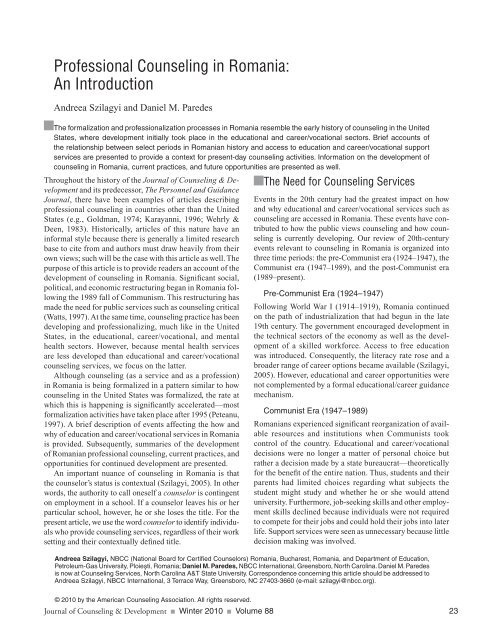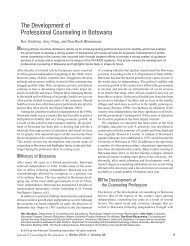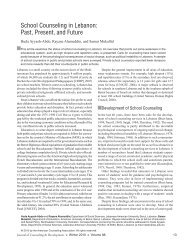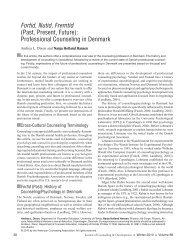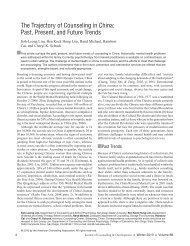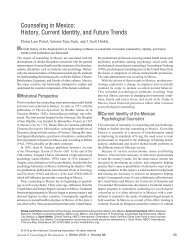Professional Counseling in Romania: An Introduction - IRCEP
Professional Counseling in Romania: An Introduction - IRCEP
Professional Counseling in Romania: An Introduction - IRCEP
Create successful ePaper yourself
Turn your PDF publications into a flip-book with our unique Google optimized e-Paper software.
<strong>Professional</strong> <strong>Counsel<strong>in</strong>g</strong> <strong>in</strong> <strong>Romania</strong>:<br />
<strong>An</strong> <strong>Introduction</strong><br />
<strong>An</strong>dreea Szilagyi and Daniel M. Paredes<br />
The formalization and professionalization processes <strong>in</strong> <strong>Romania</strong> resemble the early history of counsel<strong>in</strong>g <strong>in</strong> the United<br />
States, where development <strong>in</strong>itially took place <strong>in</strong> the educational and career/vocational sectors. Brief accounts of<br />
the relationship between select periods <strong>in</strong> <strong>Romania</strong>n history and access to education and career/vocational support<br />
services are presented to provide a context for present-day counsel<strong>in</strong>g activities. Information on the development of<br />
counsel<strong>in</strong>g <strong>in</strong> <strong>Romania</strong>, current practices, and future opportunities are presented as well.<br />
Throughout the history of the Journal of <strong>Counsel<strong>in</strong>g</strong> & Development<br />
and its predecessor, The Personnel and Guidance<br />
Journal, there have been examples of articles describ<strong>in</strong>g<br />
professional counsel<strong>in</strong>g <strong>in</strong> countries other than the United<br />
States (e.g., Goldman, 1974; Karayanni, 1996; Wehrly &<br />
Deen, 1983). Historically, articles of this nature have an<br />
<strong>in</strong>formal style because there is generally a limited research<br />
base to cite from and authors must draw heavily from their<br />
own views; such will be the case with this article as well. The<br />
purpose of this article is to provide readers an account of the<br />
development of counsel<strong>in</strong>g <strong>in</strong> <strong>Romania</strong>. Significant social,<br />
political, and economic restructur<strong>in</strong>g began <strong>in</strong> <strong>Romania</strong> follow<strong>in</strong>g<br />
the 1989 fall of Communism. This restructur<strong>in</strong>g has<br />
made the need for public services such as counsel<strong>in</strong>g critical<br />
(Watts, 1997). At the same time, counsel<strong>in</strong>g practice has been<br />
develop<strong>in</strong>g and professionaliz<strong>in</strong>g, much like <strong>in</strong> the United<br />
States, <strong>in</strong> the educational, career/vocational, and mental<br />
health sectors. However, because mental health services<br />
are less developed than educational and career/vocational<br />
counsel<strong>in</strong>g services, we focus on the latter.<br />
Although counsel<strong>in</strong>g (as a service and as a profession)<br />
<strong>in</strong> <strong>Romania</strong> is be<strong>in</strong>g formalized <strong>in</strong> a pattern similar to how<br />
counsel<strong>in</strong>g <strong>in</strong> the United States was formalized, the rate at<br />
which this is happen<strong>in</strong>g is significantly accelerated—most<br />
formalization activities have taken place after 1995 (Peteanu,<br />
1997). A brief description of events affect<strong>in</strong>g the how and<br />
why of education and career/vocational services <strong>in</strong> <strong>Romania</strong><br />
is provided. Subsequently, summaries of the development<br />
of <strong>Romania</strong>n professional counsel<strong>in</strong>g, current practices, and<br />
opportunities for cont<strong>in</strong>ued development are presented.<br />
<strong>An</strong> important nuance of counsel<strong>in</strong>g <strong>in</strong> <strong>Romania</strong> is that<br />
the counselor’s status is contextual (Szilagyi, 2005). In other<br />
words, the authority to call oneself a counselor is cont<strong>in</strong>gent<br />
on employment <strong>in</strong> a school. If a counselor leaves his or her<br />
particular school, however, he or she loses the title. For the<br />
present article, we use the word counselor to identify <strong>in</strong>dividuals<br />
who provide counsel<strong>in</strong>g services, regardless of their work<br />
sett<strong>in</strong>g and their contextually def<strong>in</strong>ed title.<br />
The Need for <strong>Counsel<strong>in</strong>g</strong> Services<br />
Events <strong>in</strong> the 20th century had the greatest impact on how<br />
and why educational and career/vocational services such as<br />
counsel<strong>in</strong>g are accessed <strong>in</strong> <strong>Romania</strong>. These events have contributed<br />
to how the public views counsel<strong>in</strong>g and how counsel<strong>in</strong>g<br />
is currently develop<strong>in</strong>g. Our review of 20th-century<br />
events relevant to counsel<strong>in</strong>g <strong>in</strong> <strong>Romania</strong> is organized <strong>in</strong>to<br />
three time periods: the pre-Communist era (1924–1947), the<br />
Communist era (1947–1989), and the post-Communist era<br />
(1989–present).<br />
Pre-Communist Era (1924–1947)<br />
Follow<strong>in</strong>g World War I (1914–1919), <strong>Romania</strong> cont<strong>in</strong>ued<br />
on the path of <strong>in</strong>dustrialization that had begun <strong>in</strong> the late<br />
19th century. The government encouraged development <strong>in</strong><br />
the technical sectors of the economy as well as the development<br />
of a skilled workforce. Access to free education<br />
was <strong>in</strong>troduced. Consequently, the literacy rate rose and a<br />
broader range of career options became available (Szilagyi,<br />
2005). However, educational and career opportunities were<br />
not complemented by a formal educational/career guidance<br />
mechanism.<br />
Communist Era (1947–1989)<br />
<strong>Romania</strong>ns experienced significant reorganization of available<br />
resources and <strong>in</strong>stitutions when Communists took<br />
control of the country. Educational and career/vocational<br />
decisions were no longer a matter of personal choice but<br />
rather a decision made by a state bureaucrat—theoretically<br />
for the benefit of the entire nation. Thus, students and their<br />
parents had limited choices regard<strong>in</strong>g what subjects the<br />
student might study and whether he or she would attend<br />
university. Furthermore, job-seek<strong>in</strong>g skills and other employment<br />
skills decl<strong>in</strong>ed because <strong>in</strong>dividuals were not required<br />
to compete for their jobs and could hold their jobs <strong>in</strong>to later<br />
life. Support services were seen as unnecessary because little<br />
decision mak<strong>in</strong>g was <strong>in</strong>volved.<br />
<strong>An</strong>dreea Szilagyi, NBCC (National Board for Certified Counselors) <strong>Romania</strong>, Bucharest, <strong>Romania</strong>, and Department of Education,<br />
Petroleum-Gas University, Ploieşti, <strong>Romania</strong>; Daniel M. Paredes, NBCC International, Greensboro, North Carol<strong>in</strong>a. Daniel M. Paredes<br />
is now at <strong>Counsel<strong>in</strong>g</strong> Services, North Carol<strong>in</strong>a A&T State University. Correspondence concern<strong>in</strong>g this article should be addressed to<br />
<strong>An</strong>dreea Szilagyi, NBCC International, 3 Terrace Way, Greensboro, NC 27403-3660 (e-mail: szilagyi@nbcc.org).<br />
© 2010 by the American <strong>Counsel<strong>in</strong>g</strong> Association. All rights reserved.<br />
Journal of <strong>Counsel<strong>in</strong>g</strong> & Development ■ W<strong>in</strong>ter 2010 ■ Volume 88 23
Szilagyi & Paredes<br />
Post-Communist Era (1989–Present)<br />
With the fall of Communism <strong>in</strong> 1989, the average <strong>Romania</strong>n<br />
citizen experienced immediate changes. Instantly, skills such<br />
as entrepreneurship, <strong>in</strong>dependent th<strong>in</strong>k<strong>in</strong>g, and consumer decision<br />
mak<strong>in</strong>g became critical. The adm<strong>in</strong>istrators of educational<br />
and career/vocational support <strong>in</strong>stitutions were tasked with<br />
restructur<strong>in</strong>g what services were provided, their <strong>in</strong>stitutional<br />
scope and roles, and how services were provided.<br />
Education. Follow<strong>in</strong>g the revolution (i.e., the fall of Communism),<br />
the <strong>Romania</strong>n education system was reorganized<br />
to more closely align with the systems of western Europe.<br />
The national curriculum and the grade promotion system<br />
were redrafted to better develop the skills necessary for<br />
competition <strong>in</strong> the free market as well (Bethell & Mihail,<br />
2005; Szilagyi, 2005; Velea & Botnariuc, 2002). Included <strong>in</strong><br />
the education reforms were various policies that highlighted<br />
the need for a counsel<strong>in</strong>g mechanism to replace the state’s<br />
student assignment mechanism. M<strong>in</strong>istry of Education<br />
(MoE) orders and other central government policies provided<br />
a base for the development of Psycho-Pedagogical Assistance<br />
Centers (PPACs) and Inter-School Psycho-Pedagogical Assistance<br />
Centers (ISPPACs) <strong>in</strong> 1995. These centers provided<br />
services consistent with what counselors <strong>in</strong> the United States<br />
recognize as school counsel<strong>in</strong>g. Additionally, the Institute<br />
of Educational Sciences, a government research and policy<br />
development th<strong>in</strong>k tank, was granted the authority to develop<br />
school counsel<strong>in</strong>g recommendations.<br />
Career/vocational. Reform <strong>in</strong> the career/vocational support<br />
sector after the revolution was grounded <strong>in</strong> the needs result<strong>in</strong>g<br />
from the widespread development of the private sector. Bus<strong>in</strong>esses<br />
demanded employees with knowledge and skills <strong>in</strong> a<br />
way that was new to most <strong>Romania</strong>ns. For the average worker,<br />
employment was no longer guaranteed, especially if they were<br />
not qualified, and competition for jobs was now commonplace.<br />
Unfortunately, the skills to understand the job market or to<br />
promote one’s skills to potential employers had not been developed<br />
dur<strong>in</strong>g the Communist era. As a consequence of the<br />
adoption of market-driven employment practices, assignment<br />
offices were reorganized <strong>in</strong>to employment assistance offices.<br />
Perhaps more important, the empowerment of <strong>in</strong>dividuals to<br />
make employment decisions was emphasized. As 20th-century<br />
events created a need for counsel<strong>in</strong>g services, formal structures<br />
for the provision of these services were <strong>in</strong>troduced.<br />
Historical Development of <strong>Counsel<strong>in</strong>g</strong><br />
<strong>in</strong> <strong>Romania</strong><br />
As <strong>in</strong> many other countries, professional counsel<strong>in</strong>g <strong>in</strong> <strong>Romania</strong><br />
has been mov<strong>in</strong>g from paraprofessional to professional<br />
status and has developed <strong>in</strong> response to the country’s social,<br />
educational, and economic needs (Bond et al., 2001; Harper<br />
& Deen, 2003; Schweiger et al., 2005). Although the bulk of<br />
the development of counsel<strong>in</strong>g as a discipl<strong>in</strong>e has taken place<br />
<strong>in</strong> the post-Communist era, we believe it is also important to<br />
acknowledge earlier events that facilitated the current development<br />
of professional counsel<strong>in</strong>g.<br />
Pre-Communist Era (1924–1947)<br />
Dur<strong>in</strong>g the period of <strong>in</strong>dustrialization between World Wars I<br />
and II, research psychologists began <strong>in</strong>vestigat<strong>in</strong>g personality<br />
and vocational profiles through standardized test<strong>in</strong>g (Peteanu,<br />
1997). The M<strong>in</strong>istry of Labor (MOL) created three psychotechnical<br />
<strong>in</strong>stitutes to house these researchers and promote<br />
guidance research activities. The staff at the <strong>in</strong>stitutes was<br />
charged with develop<strong>in</strong>g the tools necessary for vocational<br />
and educational guidance, placement, and personnel promotion<br />
(Peteanu, 1997).<br />
The tools and techniques developed by the psychotechnical<br />
centers were further ref<strong>in</strong>ed by practitioners serv<strong>in</strong>g the<br />
public at 15 Vocational Guidance Offices. The staffs at these<br />
offices were responsible for promot<strong>in</strong>g new psychological<br />
and vocational outlooks <strong>in</strong> families and secondary education<br />
sett<strong>in</strong>gs; develop<strong>in</strong>g job profiles for publication <strong>in</strong> the Occupations<br />
Monograph; and assist<strong>in</strong>g <strong>in</strong> <strong>in</strong>telligence, personality,<br />
and vocational test development.<br />
Communist Era (1947–1989)<br />
The services at this time might be more accurately characterized<br />
as assignment because client choice was <strong>in</strong>frequently taken <strong>in</strong>to<br />
account. Services cont<strong>in</strong>ued to be provided <strong>in</strong> the MOL’s Vocational<br />
Guidance Offices (Peteanu, 1997). Access to services<br />
was also improved by the MoE’s development of School and<br />
Vocational Guidance Offices. Typically, service providers had<br />
limited tra<strong>in</strong><strong>in</strong>g <strong>in</strong> help<strong>in</strong>g skills, career development, or other<br />
counsel<strong>in</strong>g-related competencies.<br />
Post-Communist Era (1989–Present)<br />
The current period of counsel<strong>in</strong>g service development began<br />
with a series of educational reforms that took place <strong>in</strong> the early<br />
1990s (Szilagyi & Paredes, 2004; Velea & Botnariuc, 2002).<br />
A time l<strong>in</strong>e of significant events is provided <strong>in</strong> Table 1. Most<br />
<strong>in</strong>strumental was the Education Law 84/1995, which mandated<br />
the creation of PPACs and ISPPACs to provide counsel<strong>in</strong>g<br />
services to children, parents, and educational staff (Peteanu,<br />
1997; Szilagyi, 2005). School counselors were required to<br />
hold a bachelor’s-level license <strong>in</strong> education, psychology, social<br />
work, or sociology. Although counsel<strong>in</strong>g-specific tra<strong>in</strong><strong>in</strong>g<br />
was available, as cont<strong>in</strong>u<strong>in</strong>g education or as master’s-degree<br />
course work from select university faculties, this tra<strong>in</strong><strong>in</strong>g was<br />
not required for school employment.<br />
<strong>An</strong>other key development <strong>in</strong> the post-Communist era was<br />
the <strong>in</strong>clusion of a counsel<strong>in</strong>g unit <strong>in</strong> the 1998–1999 national<br />
school curriculum. This unit, the National Curriculum for<br />
<strong>Counsel<strong>in</strong>g</strong> and Guidance, mandated the allotment of 1 hour of<br />
counsel<strong>in</strong>g per week, start<strong>in</strong>g <strong>in</strong> the fifth grade and cont<strong>in</strong>u<strong>in</strong>g<br />
until secondary school completion. By 2006, more than 80,000<br />
24<br />
Journal of <strong>Counsel<strong>in</strong>g</strong> & Development ■ W<strong>in</strong>ter 2010 ■ Volume 88
<strong>Professional</strong> <strong>Counsel<strong>in</strong>g</strong> <strong>in</strong> <strong>Romania</strong><br />
Year<br />
1991<br />
1995<br />
1996<br />
1997<br />
1998<br />
1999<br />
2000<br />
2001<br />
2002<br />
2003<br />
2004<br />
2005<br />
2007<br />
2009<br />
Table 1<br />
Key Events <strong>in</strong> <strong>Romania</strong>n <strong>Counsel<strong>in</strong>g</strong><br />
After the 1989 Revolution<br />
Key Event<br />
<strong>Romania</strong>n Constitution ratified<br />
Education Law 84/1995 established school counsel<strong>in</strong>g <strong>in</strong><br />
public education<br />
School counsel<strong>in</strong>g course offered at University of Bucharest<br />
<strong>Counsel<strong>in</strong>g</strong> and guidance unit added to national school<br />
curriculum<br />
Master’s degree program <strong>in</strong> school counsel<strong>in</strong>g <strong>in</strong>troduced at<br />
University of Bucharest<br />
First doctoral degree <strong>in</strong> counsel<strong>in</strong>g completed (as an <strong>in</strong>dependent<br />
study)<br />
International Association for Vocational and Educational<br />
Guidance held counsel<strong>in</strong>g conference <strong>in</strong> Brasov<br />
Government clarified role of PPAC and ISPPAC counsel<strong>in</strong>g<br />
service centers<br />
National Employment Agency created<br />
National Resource Centre for Vocational Guidance opened as<br />
part of the European Commission’s Euroguidance Network<br />
Master’s degree program <strong>in</strong> psychological counsel<strong>in</strong>g<br />
<strong>in</strong>troduced at Babes-Bolyai University<br />
<strong>Counsel<strong>in</strong>g</strong> unit <strong>in</strong> national curriculum updated<br />
Consilierea Carierei (Jigau, 2001) career counsel<strong>in</strong>g handbook<br />
published<br />
Standards for the educational and vocational assessment of<br />
children <strong>in</strong>troduced<br />
Master’s degree program <strong>in</strong> career counsel<strong>in</strong>g <strong>in</strong>troduced at<br />
Polytechnic University of Bucharest<br />
Ethical code for counsel<strong>in</strong>g developed by the Institute of<br />
Educational Sciences<br />
First <strong>Romania</strong>n-hosted <strong>in</strong>ternational counsel<strong>in</strong>g conference<br />
took place<br />
First <strong>Romania</strong>n Global Career Development Facilitator<br />
certified<br />
NBCC <strong>Romania</strong> <strong>in</strong>corporated <strong>in</strong> Bucharest<br />
<strong>Romania</strong>n <strong>Counsel<strong>in</strong>g</strong> Association created<br />
Note. Revolution = fall of Communism; PPAC = Psycho-Pedagogical<br />
Assistance Center; ISPPAC = Inter-School Psycho-Pedagogical Assistance<br />
Center; NBCC = National Board for Certified Counselors.<br />
dirig<strong>in</strong>tes (loosely similar to a U.S. homeroom teacher) were<br />
specially tra<strong>in</strong>ed by the Institute of Educational Sciences to<br />
deliver <strong>in</strong>struction <strong>in</strong> this curriculum area.<br />
The M<strong>in</strong>istry of Labor Law No. 145 (1998) was as important<br />
to the development of career counsel<strong>in</strong>g services as the<br />
Education Law 84/1995 was to school counsel<strong>in</strong>g services.<br />
The M<strong>in</strong>istry of Labor Law No. 145 authorized the creation of<br />
the National Employment Agency (NEA). Through Information<br />
and Guidance Centres and Information and Vocational<br />
<strong>Counsel<strong>in</strong>g</strong> Centres, the NEA offered vocational counsel<strong>in</strong>g<br />
and placement; a job bank; <strong>in</strong>terest, skills, and personality<br />
test<strong>in</strong>g; job search tra<strong>in</strong><strong>in</strong>g; and entrepreneurial education<br />
(Jigau, 2002). Although a master’s degree <strong>in</strong> career counsel<strong>in</strong>g<br />
is required for NEA service providers, providers often have a<br />
master’s degree <strong>in</strong> another field (Szilagyi, 2005). Thus, career<br />
counsel<strong>in</strong>g is often provided by <strong>in</strong>dividuals who may not have<br />
counselor tra<strong>in</strong><strong>in</strong>g.<br />
Significant advancements <strong>in</strong> the professionalization of<br />
counsel<strong>in</strong>g took place as social support services were <strong>in</strong>troduced.<br />
For example, formal counselor education programs<br />
were established. Lead<strong>in</strong>g counsel<strong>in</strong>g scholars at the Institute<br />
of Educational Sciences, such as Mihai Jigau, developed a<br />
code of ethics. For quality assurance purposes, a localized<br />
version of the Global Career Development Facilitator (GCDF)<br />
certification program was <strong>in</strong>troduced as well. Many of these<br />
advancements were facilitated by consultation with counsel<strong>in</strong>g<br />
bodies such as the National Board for Certified Counselors<br />
(NBCC) and the Council for Accreditation of <strong>Counsel<strong>in</strong>g</strong> and<br />
Related Educational Programs (CACREP).<br />
Current Practices<br />
Summariz<strong>in</strong>g current practices <strong>in</strong> <strong>Romania</strong> succ<strong>in</strong>ctly is challeng<strong>in</strong>g<br />
due to the lack of standardization. Currently, there<br />
is no widely accepted analogue to CACREP’s (2009) 2009<br />
Standards, the American School Counselor Association’s<br />
(2002) National Model, or the National Career Development<br />
Association’s (1997) Career <strong>Counsel<strong>in</strong>g</strong> Competencies.<br />
Therefore, we cautiously provide a general description of<br />
what counselors do <strong>in</strong> <strong>Romania</strong> and hope to engender further<br />
descriptive research.<br />
Educational Sett<strong>in</strong>gs<br />
School counsel<strong>in</strong>g activities vary depend<strong>in</strong>g on whether they<br />
are delivered with<strong>in</strong> a PPAC/ISPPAC service center or a school<br />
and whether they are provided by a counselor or a dirig<strong>in</strong>te.<br />
Services provided at the PPAC/ISPPAC service centers are<br />
typically on an <strong>in</strong>dividual counsel<strong>in</strong>g basis. As per the Education<br />
Law 84/1995, each county must have a PPAC, and schools<br />
with more than 800 pupils must have a correspond<strong>in</strong>g ISPPAC.<br />
ISPPACs serve as adjunct service centers to schools but are not<br />
staffed by the teach<strong>in</strong>g faculty. Session length is at the discretion<br />
of the client and service provider because no standard has<br />
yet been developed. ISPPAC counselors also provide <strong>in</strong>-service<br />
workshops to school staff (Szilagyi, 2005).<br />
With<strong>in</strong> the school sett<strong>in</strong>g, counsel<strong>in</strong>g is provided by school<br />
staff dur<strong>in</strong>g the dirig<strong>in</strong>te’s class. Similar to what counselors<br />
<strong>in</strong> the United States term classroom guidance, the services<br />
provided are largely <strong>in</strong>formational and broad rather than tailored<br />
to the specific needs of <strong>in</strong>dividuals. The topics addressed<br />
dur<strong>in</strong>g these sessions generally are with<strong>in</strong> the personal/social<br />
realm of school counsel<strong>in</strong>g and <strong>in</strong>clude conflict resolution,<br />
friendship, hygiene, citizenship, and so on. Furthermore, the<br />
MoE classifies dirig<strong>in</strong>tes as teachers rather than as counselors.<br />
School staff who are classified as counselors are charged with<br />
the academic and career development of students schoolwide.<br />
Despite large student-to-counselor ratios, school counselors<br />
make efforts to work with <strong>in</strong>dividuals as well as small and<br />
large groups.<br />
Career/Vocational Sett<strong>in</strong>gs<br />
Career counsel<strong>in</strong>g services are provided through government<br />
agencies, such as the NEA, and private practitioners. These<br />
Journal of <strong>Counsel<strong>in</strong>g</strong> & Development ■ W<strong>in</strong>ter 2010 ■ Volume 88 25
Szilagyi & Paredes<br />
services are generally oriented toward workforce entry. In<br />
addition to skills-based <strong>in</strong>terventions (e.g., résumé writ<strong>in</strong>g<br />
consultation, job search skills development), counselors<br />
sometimes conduct personality assessments and encourage<br />
client self-exploration to identify possible career paths.<br />
Counselor Education<br />
Increased demand for counsel<strong>in</strong>g services has led to <strong>in</strong>creased<br />
demand for counselor tra<strong>in</strong><strong>in</strong>g programs. Although counsel<strong>in</strong>g<br />
is not recognized by the <strong>Romania</strong>n government as a unique<br />
licensure-level profession, counsel<strong>in</strong>g is provided by psychologists,<br />
sociologists, social workers, and teachers with additional<br />
tra<strong>in</strong><strong>in</strong>g. Counselor-specific tra<strong>in</strong><strong>in</strong>g is provided at the<br />
master’s level and is provided <strong>in</strong> education, psychology, and<br />
management faculties. The University of Bucharest’s school<br />
counsel<strong>in</strong>g program, which opened <strong>in</strong> 1996, was the first<br />
counselor-specific tra<strong>in</strong><strong>in</strong>g program <strong>in</strong> <strong>Romania</strong>. Counselor<br />
tra<strong>in</strong><strong>in</strong>g is ma<strong>in</strong>ly based on theories and techniques developed<br />
<strong>in</strong> the United States and western Europe. Individuals notable<br />
for the adaptation of exist<strong>in</strong>g resources and the development of<br />
new ones for <strong>Romania</strong>n counselors are Adriana Baban, Mihai<br />
Jigau, Gheorghe Tomsa, and George Vaideanu.<br />
Opportunities for Development<br />
Policy and social changes have created many opportunities for<br />
the <strong>Romania</strong>n counsel<strong>in</strong>g movement. Currently, there is some<br />
confusion regard<strong>in</strong>g the role of counselors vis-à-vis other<br />
help<strong>in</strong>g professionals (psychologists, social workers, etc.) and<br />
the services each provides. Thus, a clearly def<strong>in</strong>ed scope of<br />
practice that <strong>in</strong>tegrates the tasks identified <strong>in</strong> various government<br />
policies will help <strong>Romania</strong>n counselors better articulate<br />
their professional role. Just as counsel<strong>in</strong>g was viewed with<br />
skepticism <strong>in</strong> the United States a few decades ago, <strong>Romania</strong>n<br />
counselors know that many colleagues and consumers are<br />
skeptical of <strong>Romania</strong>n professional counsel<strong>in</strong>g. Thus, the<br />
leaders of the <strong>Romania</strong>n counsel<strong>in</strong>g movement have decided<br />
to address stakeholder concerns with a professionalization<br />
strategy that borrows from the experiences of counsel<strong>in</strong>g<br />
practitioners <strong>in</strong> the United States. <strong>Professional</strong>ization efforts<br />
<strong>in</strong> <strong>Romania</strong> are focused on the simultaneous development of a<br />
counsel<strong>in</strong>g association, counselor tra<strong>in</strong><strong>in</strong>g standards, credential<strong>in</strong>g<br />
mechanism, and expansion of the knowledge base.<br />
<strong>Romania</strong>n <strong>Counsel<strong>in</strong>g</strong> Association<br />
Currently, <strong>Romania</strong>n counselors are fragmented and relatively<br />
isolated. In the United States, the merger that resulted <strong>in</strong> the<br />
creation of the American Personnel and Guidance Association<br />
(now called the American <strong>Counsel<strong>in</strong>g</strong> Association) facilitated<br />
the development of a s<strong>in</strong>gular professional identity (Remley<br />
& Herlihy, 2001; Sweeney, 2001). <strong>Romania</strong>n counsel<strong>in</strong>g<br />
leaders have therefore concluded that the creation of a <strong>Romania</strong>n<br />
counsel<strong>in</strong>g association is critical to the formation of<br />
a professional identity. Although <strong>Romania</strong>n counselors have<br />
made attempts to create a professional association (i.e., the<br />
National Association for Educational and Vocational Guidance),<br />
they found this association is slow to grow and <strong>in</strong> need<br />
of a more <strong>in</strong>clusive scope. In 2009, a small <strong>in</strong>itiative group<br />
of practitioners and counselor educators decided to create the<br />
<strong>Romania</strong>n <strong>Counsel<strong>in</strong>g</strong> Association, under the supervision of<br />
NBCC <strong>Romania</strong>. The association created a draft of a code<br />
of ethics and stated the follow<strong>in</strong>g as goals: set tra<strong>in</strong><strong>in</strong>g and<br />
practice standards, dissem<strong>in</strong>ate a body of knowledge, and<br />
organize advocacy activities.<br />
Standardized Counselor Tra<strong>in</strong><strong>in</strong>g<br />
The work of organizations such as the Association for Counselor<br />
Education and Supervision and CACREP has helped professional<br />
counsel<strong>in</strong>g advocates describe the tra<strong>in</strong><strong>in</strong>g that characterizes the<br />
profession <strong>in</strong> the United States. Although there is some similarity<br />
<strong>in</strong> <strong>Romania</strong>n career counselor tra<strong>in</strong><strong>in</strong>g programs that have<br />
adopted the GCDF framework, programs with other areas of<br />
emphasis, such as school and psychological counsel<strong>in</strong>g, are also<br />
tra<strong>in</strong><strong>in</strong>g counselors. Tra<strong>in</strong><strong>in</strong>g standards and competencies that<br />
reflect a broader range of expertise will be needed as a foundation<br />
to foster the cont<strong>in</strong>ued development of the profession.<br />
Counselor Credential<strong>in</strong>g<br />
Many of the identity and quality problems that the <strong>Romania</strong>n<br />
counsel<strong>in</strong>g community is fac<strong>in</strong>g could be solved by<br />
<strong>in</strong>troduc<strong>in</strong>g a national certification. A clear set of education<br />
requirements that <strong>in</strong>clude field experience, assessment and<br />
supervision course work, as well as adherence to a code of<br />
ethics could facilitate description of the professional group. A<br />
national certificate <strong>in</strong> counsel<strong>in</strong>g would also allow the members<br />
of the various specialties to call themselves counselors<br />
regardless of the context <strong>in</strong> which they practice.<br />
Knowledge Base<br />
A significant need for the cont<strong>in</strong>ued development of counsel<strong>in</strong>g<br />
is the development of a unique knowledge base. Although<br />
there is some research and other scholarly literature from the<br />
Institute of Educational Sciences and university professors,<br />
widespread dissem<strong>in</strong>ation of their f<strong>in</strong>d<strong>in</strong>gs is lack<strong>in</strong>g. The<br />
<strong>in</strong>troduction of a national journal would facilitate the dissem<strong>in</strong>ation<br />
of current research and provide <strong>in</strong>formation about<br />
new techniques and strategies.<br />
<strong>Romania</strong>n counselors may also cont<strong>in</strong>ue to use dissem<strong>in</strong>ation<br />
methods currently <strong>in</strong> use, such as the translation of<br />
select counsel<strong>in</strong>g texts <strong>in</strong>to the local language, the <strong>in</strong>vitation<br />
of foreign specialists to deliver lectures and workshops, and<br />
counsel<strong>in</strong>g faculty and student exchanges.<br />
Conclusion<br />
The growth of counsel<strong>in</strong>g services and counsel<strong>in</strong>g as a profession<br />
<strong>in</strong> <strong>Romania</strong> has progressed at an <strong>in</strong>creas<strong>in</strong>gly rapid pace<br />
s<strong>in</strong>ce 1995 (Peteanu, 1997). This growth has been spurred by<br />
26<br />
Journal of <strong>Counsel<strong>in</strong>g</strong> & Development ■ W<strong>in</strong>ter 2010 ■ Volume 88
<strong>Professional</strong> <strong>Counsel<strong>in</strong>g</strong> <strong>in</strong> <strong>Romania</strong><br />
the critical need for social, educational, and career/vocational<br />
support services follow<strong>in</strong>g the fall of Communism <strong>in</strong> 1989<br />
(Szilagyi, 2005; Watts, 1997). The transition from a Communist<br />
system to a free market system has resulted <strong>in</strong> significant<br />
changes to how education and career/vocational services are<br />
accessed by the average <strong>Romania</strong>n citizen. At the same time,<br />
counsel<strong>in</strong>g practitioners have been tak<strong>in</strong>g steps toward a<br />
unique professional identity.<br />
The way <strong>in</strong> which counsel<strong>in</strong>g, both as a series of service programs<br />
and as a profession, has been developed is similar to the<br />
strategy used <strong>in</strong> the United States. Initial development has taken<br />
place <strong>in</strong> educational and career/vocational counsel<strong>in</strong>g. As services<br />
have ga<strong>in</strong>ed <strong>in</strong>creased public and governmental support, the need<br />
for standards characteristic of professionalization (e.g., tra<strong>in</strong><strong>in</strong>g<br />
standards, ethical codes, credential<strong>in</strong>g) has become more evident.<br />
Recent activities by the leaders of the burgeon<strong>in</strong>g <strong>Romania</strong>n counsel<strong>in</strong>g<br />
profession have focused on improv<strong>in</strong>g the quality of services<br />
provided and <strong>in</strong> promot<strong>in</strong>g counselors as a unique professional<br />
group. The ongo<strong>in</strong>g series of changes <strong>in</strong> <strong>Romania</strong>n society suggest<br />
that counsel<strong>in</strong>g will cont<strong>in</strong>ue to grow <strong>in</strong> the foreseeable future.<br />
References<br />
American School Counselor Association. (2002). The ASCA National<br />
Model: A framework for school counsel<strong>in</strong>g programs. Alexandria,<br />
VA: Author.<br />
Bethell, G., & Mihail, R. (2005). Assessment and exam<strong>in</strong>ations <strong>in</strong><br />
<strong>Romania</strong>. Assessment <strong>in</strong> Education, 12, 77–96.<br />
Bond, T., Lee, C., Lowe, R., Malayapillay, A. E., Wheeler, S., Banks,<br />
A., et al. (2001). The nature of counsel<strong>in</strong>g: <strong>An</strong> <strong>in</strong>vestigation of<br />
counsel<strong>in</strong>g activity <strong>in</strong> selected countries. International Journal<br />
for the Advancement of Counsell<strong>in</strong>g, 23, 245–260.<br />
Council for Accreditation of <strong>Counsel<strong>in</strong>g</strong> and Related Educational Programs.<br />
(2009). 2009 CACREP acceditation manual. Alexandria,<br />
VA: Author.<br />
Education Law No. 84/24.07.1995 [art 49. al<strong>in</strong> (1)] (1995).<br />
Goldman, L. (Ed.), Avent, C., Christie, C. A., Dave, I., Deen, N.,<br />
Epps, S., et al. (1974). Guidance U.S.A.: Views from abroad.<br />
The Personnel and Guidance Journal, 53, 40–56.<br />
Harper, F. D., & Deen, N. (2003). The <strong>in</strong>ternational counsel<strong>in</strong>g movement.<br />
In F. D. Harper & J. McFadden (Eds.), Culture and counsel<strong>in</strong>g:<br />
New approaches (pp. 147–163). Boston: Allyn & Bacon.<br />
Jigau, M. (2001). Consilierea carierei [Career counsel<strong>in</strong>g]. Bucharest,<br />
<strong>Romania</strong>: Sigma Publish<strong>in</strong>g House<br />
Jigau, M. (2002). <strong>Romania</strong>. In R. G. Sultana (Ed.), Review of career<br />
guidance policies <strong>in</strong> 11 acced<strong>in</strong>g and candidate countries: Synthesis<br />
report (pp. 75–78). Luxembourg, Luxembourg: European<br />
Tra<strong>in</strong><strong>in</strong>g Foundation.<br />
Karayanni, M. (1996). The emergence of school counsel<strong>in</strong>g and<br />
guidance <strong>in</strong> Israel. Journal of <strong>Counsel<strong>in</strong>g</strong> & Development, 74,<br />
582–587.<br />
M<strong>in</strong>istry of Labor Law No. 145 of 09.07.1998 (1998).<br />
National Career Development Association. (1997). Career <strong>Counsel<strong>in</strong>g</strong><br />
Competencies (Rev. ed.). Broken Arrow, OK: Author.<br />
Peteanu, M. (1997). Educational and vocational guidance <strong>in</strong> <strong>Romania</strong>:<br />
Short history. Revista de Pedagogie, 1–12, 314–324.<br />
Remley, T., & Herlihy, B. (2001). Ethical, legal, and professional<br />
issues <strong>in</strong> counsel<strong>in</strong>g. Upper Saddle River, NJ: Merrill-Prentice<br />
Hall.<br />
Schweiger, W. K., Ayyash-Abdo, H., Choi, K., Dipal, M., Edwards-<br />
Joseph, A. R. A. C., Ermakov, N., et al. (2005, October).<br />
Spann<strong>in</strong>g the globe, Part II. Presentation at the annual meet<strong>in</strong>g<br />
of the Association for Counselor Education and Supervision,<br />
Pittsburgh, PA.<br />
Sweeney, T. J. (2001). <strong>Counsel<strong>in</strong>g</strong>: Historical orig<strong>in</strong>s and philosophical<br />
roots. In D. C. Locke, J. E. Myers, & E. L. Herr (Eds.), The<br />
handbook of counsel<strong>in</strong>g (pp. 3–26). Thousand Oaks, CA: Sage.<br />
Szilagyi, A. A. (2005). The status of counsel<strong>in</strong>g profession <strong>in</strong> <strong>Romania</strong>.<br />
In H. J. Weissbach, T. Coll<strong>in</strong>s, T. Clawson, A. Szilagyi,<br />
& G. Boarescu (Eds.), Career counsel<strong>in</strong>g and the global labor<br />
market (pp. 25–28). Mures, <strong>Romania</strong>: Editura Universitatii “Petru<br />
Maior” Tg.<br />
Szilagyi, A. A., & Paredes, D. M. (2004, October). Engender<strong>in</strong>g<br />
systemic change through counsel<strong>in</strong>g: Progress <strong>in</strong> <strong>Romania</strong>. Paper<br />
presented at the annual meet<strong>in</strong>g of the Southern Association for<br />
Counselor Education and Supervision, Atlanta, GA.<br />
Velea, S., & Botnariuc, P. (2002). Education reform <strong>in</strong> <strong>Romania</strong> dur<strong>in</strong>g<br />
the last 12 years. Work<strong>in</strong>g paper for the Summer University,<br />
Central European University, Budapest, Hungary.<br />
Watts, A. G. (1997). The role of career guidance <strong>in</strong> societies <strong>in</strong><br />
transition. Revista de Pedagogie, 1–12, 417–428.<br />
Wehrly, B., & Deen, N. (Eds.). (1983). Special issue on <strong>in</strong>ternational<br />
guidance and counsel<strong>in</strong>g [Special issue]. The Personnel and<br />
Guidance Journal, 61(8).<br />
Journal of <strong>Counsel<strong>in</strong>g</strong> & Development ■ W<strong>in</strong>ter 2010 ■ Volume 88 27


